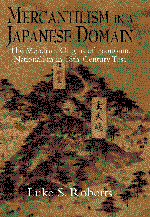Book contents
- Frontmatter
- Contents
- List of maps, tables, and figures
- Acknowledgments
- Dates and units of measurement used in the text
- Maps
- 1 Introduction
- 2 The geography and politics of seventeenth-century Tosa
- 3 Creating a crisis in Tosa, 1680–1787
- 4 The decline and restoration of domain finances
- 5 Voices of dissatisfaction and change: The petition box
- 6 Imagined economies: Merchants and samurai
- 7 Declining service
- 8 Cooking up a country: Sugar, eggs, and gunpowder, 1759–1868
- 9 Conclusion
- Glossary of terms and manuscript document titles used in the text
- Sources for figures and tables
- Works and documents cited
- Index
3 - Creating a crisis in Tosa, 1680–1787
Published online by Cambridge University Press: 17 September 2009
- Frontmatter
- Contents
- List of maps, tables, and figures
- Acknowledgments
- Dates and units of measurement used in the text
- Maps
- 1 Introduction
- 2 The geography and politics of seventeenth-century Tosa
- 3 Creating a crisis in Tosa, 1680–1787
- 4 The decline and restoration of domain finances
- 5 Voices of dissatisfaction and change: The petition box
- 6 Imagined economies: Merchants and samurai
- 7 Declining service
- 8 Cooking up a country: Sugar, eggs, and gunpowder, 1759–1868
- 9 Conclusion
- Glossary of terms and manuscript document titles used in the text
- Sources for figures and tables
- Works and documents cited
- Index
Summary
It is astonishing to see the clear decline in our country's ability to produce wealth over the past fifty years. The agricultural tax has decreased annually, our forests have all been cut, the number of boats for commerce and fishing has dwindled.
Tosa retainer Matsuo Hikotarō, 1759By the beginning of the eighteenth century, Tosa had entered an acute period of hardship. Hikotarō's bleak appraisal of the Tosa economy at the middle of the eighteenth century linked together many strands of a complex story of developing crisis. He could have added to his list the wreck that domain finances had become, and the frequent occurrence of famine and flooding that plagued the domain. The interactions of population growth, agricultural development, deforestation, and rising taxation had produced sad conditions in Tosa by the eighteenth century. Tosa's economy had grown rapidly in the early and middle part of the seventeenth century, and this was brought about by the economy of service to the Tokugawa in which most taxes were spent by the lord outside of the domain for alternate attendance or other duty and which made the private economy of Tosa heavily dependent upon an Osaka-controlled market. The growth had been rapid, but by the eighteenth century, these same relationships had contributed to creating the problems lamented by Hikotarō and a world in which there was a widespread loss of respect for the rulers.
- Type
- Chapter
- Information
- Mercantilism in a Japanese DomainThe Merchant Origins of Economic Nationalism in 18th-Century Tosa, pp. 56 - 84Publisher: Cambridge University PressPrint publication year: 1998



